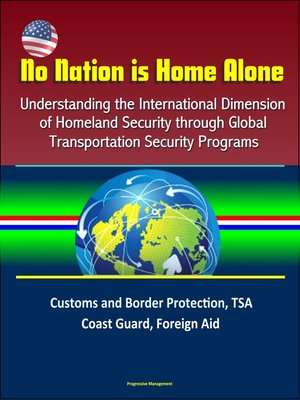No Nation is Home Alone
ebook ∣ Understanding the International Dimension of Homeland Security through Global Transportation Security Programs--Customs and Border Protection, TSA, Coast Guard, Foreign Aid
By Progressive Management

Sign up to save your library
With an OverDrive account, you can save your favorite libraries for at-a-glance information about availability. Find out more about OverDrive accounts.
Find this title in Libby, the library reading app by OverDrive.



Search for a digital library with this title
Title found at these libraries:
| Library Name | Distance |
|---|---|
| Loading... |
This excellent report has been professionally converted for accurate flowing-text e-book format reproduction. Terrorist actors focus on the global transportation system to introduce threats and target attacks. As the lead department for securing the transportation system into the United States, the Department of Homeland Security (DHS) works both domestically and internationally to implement programs and foreign assistance activities to secure the global transportation network. This thesis examines DHS' international role by analyzing programs and policies implemented by its three largest global transportation agencies: the U.S. Customs and Border Protection Agency, the Transportation Security Administration, and the U.S. Coast Guard. Due to the breadth of DHS programs and activities, their stated goals and objectives, and their legal mandates, this thesis determines that a U.S. foreign assistance framework provides minimal insight into DHS' international footprint. Instead, this research developed a simple model for understanding the primary components of DHS' international mission space and identified operations, policy, outreach and engagement, and training and technical assistance as core concepts in DHS' international mission. Using this model, DHS can pursue the additional recommendations developed in this thesis—applying systems theory as a basis for an international transportation security strategy as well as pursuing direct funding for its international transportation programs and activities as a fully integrated department—within the traditional U.S. foreign policy and national security institutions.
CHAPTER I - INTRODUCTION * A. PROBLEM STATEMENT * B. METHODOLOGY * C. ARGUMENT AND CLAIMS * D. PURPOSE AND AUDIENCE * E. THESIS OVERVIEW * CHAPTER II - LITERATURE REVIEW * A. DHS' INTERNATIONAL ROLE * B. U.S. FOREIGN ASSISTANCE * 1. Foreign Assistance * 2. Capacity Development * C. CHAPTER CONCLUSION * CHAPTER III - GLOBAL TRANSPORTATION AND DHS INTERNATIONAL TRANSPORTATION SECURITY PROGRAMS * A. THE GLOBAL TRANSPORTATION SYSTEM * B. DEPARTMENT OF HOMELAND SECURITY * 1. Mission, Legal Authorities, and Organizational Structure * 2. Programs * C. U.S. CUSTOMS AND BORDER PROTECTION * 1. Mission, Legal Authorities, and Organizational Structure * 2. Programs * a. Preclearance * b. Container Security Initiative * c. Immigration Advisory Program * D. TRANSPORTATION SECURITY ADMINISTRATION * 1. Mission, Legal Authorities, and Organizational Structure * 2. Programs * a. Foreign Airport Assessment Program * b. Capacity Development * E. U.S. COAST GUARD * 1. Mission, Legal Authorities, and Organizational Structure * 2. Programs * a. ISPS Facility Security Assessments * b. Foreign Military Sales * c. Mobile Training Teams * F. CHALLENGES FOR DHS, TSA, CBP, AND USCG * CHAPTER IV - ANALYSIS: DHS WITHIN THE U.S. FOREIGN ASSISTANCE FRAMEWORK * A. U.S. FOREIGN ASSISTANCE * 1. History * 2. Challenges * 3. Framework for Analysis * B. FINDINGS * C. CONCLUSIONS, RECOMMENDATIONS, AND FUTURE RESEARCH * 1. Proposed Model * 2. Lobby Congress for Direct Funding * 3. Opportunities for Additional Research * D. LIMITATIONS * E. CONCLUSION







